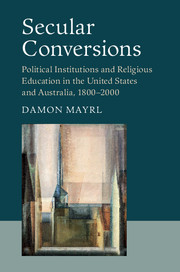 Secular Conversions
Secular Conversions Book contents
- Frontmatter
- Contents
- List of Figures and Tables
- Acknowledgments
- List of Acronyms
- Introduction
- 1 Politics, Institutions, and Secularization
- Part I Forging the nineteenth-century settlement
- Part II The nineteenth-century settlement in transition
- Part III Forging the twentieth-century settlement
- Part IV Implications
- 7 Conclusion
- Epilogue: Toward a Twenty-First-Century Settlement?
- Index
7 - Conclusion
from Part IV - Implications
Published online by Cambridge University Press: 05 August 2016
- Frontmatter
- Contents
- List of Figures and Tables
- Acknowledgments
- List of Acronyms
- Introduction
- 1 Politics, Institutions, and Secularization
- Part I Forging the nineteenth-century settlement
- Part II The nineteenth-century settlement in transition
- Part III Forging the twentieth-century settlement
- Part IV Implications
- 7 Conclusion
- Epilogue: Toward a Twenty-First-Century Settlement?
- Index
Summary
By 1975, the new twentieth-century settlements had solidified in each country. Australia's system of public funding for religious schools, and America's strictly secular public schools, were largely accepted as the law of the land, despite ongoing legal and administrative challenges. Yet, as taken for granted as these arrangements may seem today, they reflect the sedimentation of multiple and longstanding political processes, as well as the unmistakable imprint of each country's peculiar political institutions. While this study has presented a novel interpretation for the emergence of these two secular settlements, it has also highlighted a number of dynamics whose relevance extends beyond these two cases. In this conclusion, therefore, I consider some of the broader implications of this study, both for secularization theory, and for our understanding of American political culture more generally.
RETHINKING SECULARIZATION
Secularization takes multiple forms, engages multiple actors with multiple motives, occurs in multiple contexts, and leads to multiple outcomes. In this book, I have attempted to develop an approach to studying secularization that embraces this multiplicity. Current theories of secularization provide important yet ultimately partial insights into the dynamics of religious change. They suggest we look to modernity, established churches, self-interested politicians, or intellectual elites to explain the secular settlements we see around us. Each captures part – but only part – of a much more complex and contingent story. I have attempted to develop an approach that allows us to put these insights into dialogue with one another and with the historical record, to see how these factors can work with or against one another, with greater or lesser force, in which patterns, and why. To appreciate this complexity, we need to approach secularization as a contingent and politically mediated outcome. And this means beginning with the political conflicts that lie at its core.
Politics and Contingency
Recent approaches to secularization have rightly emphasized its political dimension. Ultimately, secularization is driven by political conflicts, such as whether religious actors will be granted control over important social functions, whether religious ideas will define the contours of thought and action within social domains, and in what form religion will be recognized in public life. Different groups take different stances on these issues, and in so doing introduce the political dynamism that drives religious change.
- Type
- Chapter
- Information
- Secular ConversionsPolitical Institutions and Religious Education in the United States and Australia, 1800–2000, pp. 241 - 252Publisher: Cambridge University PressPrint publication year: 2016


